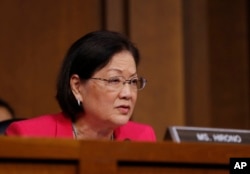Nearly three months into his second tenure at the helm of the U.S Justice Department, Attorney General William Barr finds himself in a hornet's nest he once sought to avoid.
In June 2017, just as special counsel Robert Mueller was widening his probe of Russian interference in the 2016 U.S. election, Barr, then a lawyer in private practice in Washington, was ushered into the Oval Office.
President Donald Trump was beefing up his legal defense team amid allegations that his campaign had colluded with Russia. Trump wanted to know whether the semiretired Barr was "envisioning some role here," but Barr said he wasn't.
"I didn't want to stick my head into that meat grinder," Barr recalled during his confirmation hearing in January.
The Republican attorney general faces a barrage of criticism and a possible contempt vote by House Democrats over his characterizations of Mueller's final report, including charges that he's acted more like Trump's personal lawyer than an independent broker.
Trump had a famously fraught relationship with his first attorney general, former Republican Sen. Jeff Sessions of Alabama, whom he publicly belittled for allowing the Justice Department to investigate him.
Critics say that in Barr, who first served as attorney general in the administration of former President George H. W. Bush, Trump has finally found a partisan willing to stick up for him.
"We have a chief law enforcement officer who is definitely the defense lawyer for the president," Democratic Sen. Mazie Hirono of Hawaii, one of Trump's staunchest critics in Congress, said during an acrimonious Senate Judiciary Committee hearing on the Mueller report on Wednesday.
Hirono and some other Democrats have been calling on the attorney general to resign for failing to divulge, in earlier congressional appearances, that Mueller had complained that Barr had not fully conveyed the findings of his report critical of Trump. House Speaker Nancy Pelosi said Barr had lied to Congress and called it a "crime."
Justice Department officials have called the allegations scurrilous and say the attorney general has no intention of stepping down.
The controversy gripping Washington started after Mueller submitted a 448-page report on his investigation to Barr on March 22. The report concluded that there was insufficient evidence of coordination between the Trump campaign and Russia to support charges, but it left unanswered the question of whether Trump had obstructed justice despite citing 11 instances of potential obstruction.
Barr said he was puzzled by Mueller's indecision, so he and his No. 2, Rod Rosenstein, examined the evidence and concluded there weren't sufficient grounds to charge Trump with obstruction of justice.
Barr's legal determination, first outlined in a March 24 summary letter to Congress, outraged Democrats. Many worried that it enabled Trump to claim "total vindication" before the full report was released.
The attacks on the attorney general's actions reached a crescendo this week after it emerged that Mueller had complained in a letter to Barr that his summary to Congress "did not fully capture the context, nature and substance" of his conclusions.
Barr's defenders say the attorney general followed Justice Department regulations and had no choice but to make a legal determination about a question Mueller had left unanswered.
"He and he alone as the chief law enforcement officer of the United States was left with the burden and the responsibility to do something after he got that report," said Charles Stimson, a senior legal fellow at the conservative Heritage Foundation. "I don't think Attorney General Barr was necessarily saying, 'I approve of the president's conduct here.' "
The attorney general, Stimson said, had made good on a pledge he made at his January confirmation that he would not interfere with the Mueller investigation and that he'd release as much information as possible to Congress and the public.
"I think what's really undergirding all of the angst and anger on the side of the Democrats is that the Mueller report did not find collusion," Stimson said.
Tim Flanigan, a former assistant attorney general under Barr in the early 1990s, rejected the Democrats' depiction of Barr as Trump's defense lawyer.
"I can understand why they're making that characterization for political purposes, but it has no basis in fact," said Flanigan, who is now the chief legal officer for Cancer Treatment Centers of America. "I'm very familiar with the way the independent counsel regulations function, and it seems to me that Bill has, in every step of the way, performed exactly the duties that he was required to do."







